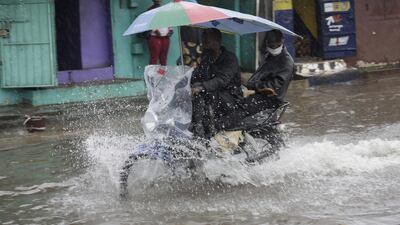Developing countries set out their demands for the Cop26 climate summit with a call for the rich world to increase funding.
They said there could be “no more excuses” as Britain prepares to host the November summit.
Africa needs an estimated $3 trillion to reach its climate goals and the rich world is under fire for failing to meet its promises of aid.
A target of $100 billion in annual support to the global south has not been met, according to the UN’s climate agency.
A five-point plan for Cop26 put forward by a coalition of developing countries said wealthy nations should set out clearly how they intend to raise the funds.
More money from the rich world would help African countries to adapt to climate change and mitigate the effect in future of rising temperatures.
But Cop26 delegates were also told to provide funding to address the loss and damage that many countries are already suffering.
Major environmental damage is expected even if the world meets its aim of limiting global warming to 1.5°C above pre-industrial levels.
This was the goal set out in the 2015 Paris Agreement, but developing countries want Cop26 to set more ambitious targets to reach it.
Scientists say that emissions cuts are needed in the short term and cannot be delayed in exchange for planting billions of trees in the future.

The EU this week unveiled a sweeping climate overhaul to slash emissions by 55 per cent compared with 1990 levels by the end of the decade.
But environmental groups say it is not enough, and developing countries say the world’s current plans will not be sufficient to meet the Paris target.
“Despite welcome recent progress, the sum total of climate policies in place across the world will not keep global warming within the limits that governments agreed to in Paris,” the developing nations said.
“There can be no more excuses. Governments with a leadership responsibility need to deliver on their promises, showing solidarity with the less prosperous, to reach an outcome for Cop26 that is fair and robust. And they need to deliver now.”
Another key demand of developing countries is help with adapting to the effects of climate change.
Adaption measures include building flood defences and weather warning systems to prevent natural disasters.
Environment, Forest and Climate Change Commission, Ethiopia
Many developing countries are especially vulnerable to extreme weather events such as floods and droughts.
At least 50 per cent of climate finance should go towards adaptation measures, developing countries say in their Cop26 plan.
The promise of an annual $100 billion was made at a Copenhagen climate summit in 2009, with the pledge that the target would be reached by 2020.
The UN said the amount of money mobilised by rich countries was $78.9bn in 2018 but was not rising fast enough for the target to be met.
“A lack of keeping promises on these key areas of finance, adaptation, and loss-of-damage is unacceptable,” said Fekadu Beyene of the Ethiopian Environment, Forest and Climate Change commission.
“What’s the point of agreeing on a new set of promises if we don’t keep them?”.


